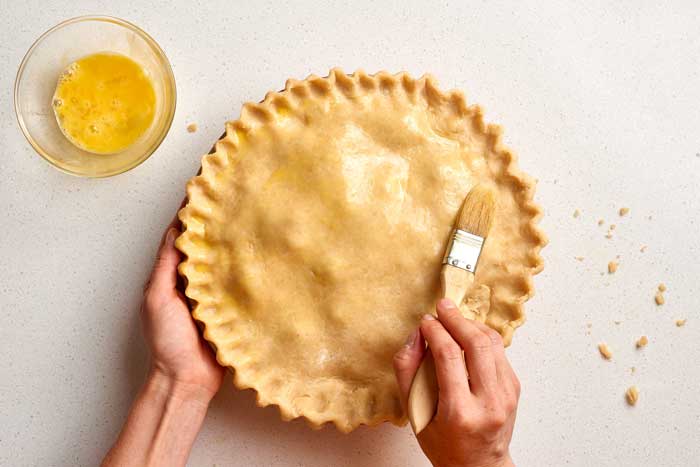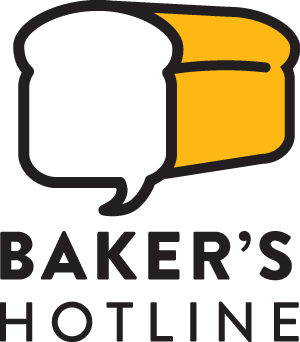While melted butter adds more flavor than the washes, it is less effective in look; it gives a speckled appearance to pastry. But, if you plan to sprinkle the crust with sugar, melted butter could be a good choice—the sugar will hide the speckles, and the combination of butter and sugar is delicious.

The perfect finish Share
Anointing the top of your pie may seem like gilding the lily — I mean, how can you improve on your already perfect apple pie? But topping pie crust with a spritz of water and a sprinkle of sugar, or a quick brush of sweet butter followed by the merest drift of flour, can take your pie — both its flavor and its texture — to a new level.
Lets start with a base layer thatll support the sugar (and spice) to come.
Ive brushed these pastry rounds with some popular crust toppings: egg white wash (egg white + water), water, whole egg wash, milk, and butter. Ive also left one round untouched (upper left, the “control”), for comparison.
You can see the results: both of the egg washes, milk, and butter add golden color to crust, with whole egg adding the most. In addition, the two egg crusts have a satiny/shiny finish, where the remaining crusts are basically matte, with perhaps just a hint of shine on the milk and butter crusts.
The butter crust offers a tiny bit more flavor than any of the others, but also has a somewhat speckled appearance, the result of milk solids separating from fat. Of course, if you plan on sprinkling the crust with your favorite sugar, the speckles will disappear.
Now, lets see what happens when we add toppings.
I pile apple pie filling (no bottom crust) into the wells of a hamburger bun pan — which does slick double duty as a mini pie pan.
On top, I place pastry rounds brushed with water (except one thats brushed with butter). Starting at upper left and going to lower right, here are the toppings:
- granulated sugar, the standard sugar you bake with
- cinnamon-sugar, a mixture of granulated sugar and cinnamon
- coarse sparkling sugar, a large-crystalled, “glittery” sugar
- confectioners sugar, superfine granulated sugar mixed with cornstarch
- melted butter topped with all-purpose flour, to create a thin layer of buttery flakiness
- Swedish pearl sugar, a coarse-grained, bright white sugar
And here they are, baked and ready to enjoy. Lets take a closer look.
Note how regular granulated sugar (left) melts a bit to form shards of sweetness. The cinnamon-sugar (right) adds color and wonderful flavor, but I should have been more careful when sprinkling; the opaque patch signals too thick a coat.
Confectioners sugar (left) creates a wintry appearance, like hoarfrost on a meadow. The butter/flour coating (right) doesnt result in any flakiness (old wives tale, I guess); but nonetheless is velvety in texture, and pleasantly buttery.
 Coarse sugar (left) melts just a bit, but retains its crunchy texture and gives the crust some sparkle. Swedish pearl sugar (right) doesnt melt; its bright white color makes the crust stand out in a crowd, and its crunch is a nice complement to the soft apples underneath.
Coarse sugar (left) melts just a bit, but retains its crunchy texture and gives the crust some sparkle. Swedish pearl sugar (right) doesnt melt; its bright white color makes the crust stand out in a crowd, and its crunch is a nice complement to the soft apples underneath.
One additional test pits crust brushed with water (left) vs. crust brushed with beaten egg (right), both topped with coarse sugar.
The water encourages some of the sugar to melt; while the beaten-egg helps the coarse sugar retain its shape as individual crystals. Choose your favorite look.
So, whats the verdict? Bare naked, sugar shards, golden egg…
Personally, I swap these various combinations in and out depending on my audience. There are those in my family who dont care for cinnamon; and some who love crunch; and some who embrace a minimalist approach, with no topping at all or just butter and flour.
And at the end of the day, theres really no need to pick and stick with a favorite; theyre all immensely satisfying.
Tips for perfect fruit scones.
Planet-friendly changes you can start making today.
A mashup cannoli cheesecake, a mind-blowing churro cupcake, and more.
Recipe of the Year 2024
See our complete collection of Recipes posts.

How to Make and Use an Egg Wash | Baking Basics
FAQ
What does brushing butter on pie crust do?
What is best to brush on pie crust before baking?
Should you butter pie crust before baking?
Why is butter not recommended in the preparation a pie dough?
Should you brush butter on a pie crust?
If you are using a traditional butter crust, the butter won’t add much additional flavor, but it can help the crust to brown more evenly and give it a nice golden color. On the other hand, if you are using a pre-made pie crust, brushing butter on top can help it to remain flaky and tender after baking.
How do you make a butter pie crust?
Fill a glass with 1 cup of water, add ice. You only need 1/2 cup of water in this butter pie crust recipe, but have a little extra just in case. Use cold butter. I keep some of my butter in the freezer and transfer it to the refrigerator a couple hours before beginning the crust. The butter is part frozen and very cold.
How to bake a perfect pie crust?
To bake a perfect pie crust, you must be both patient and precise. To prevent gluten buildup in the flour, all of the ingredients should be kept at room temperature, from butter to water. Making the dough can be done in as little as a minute by combining butter from the refrigerator with ice-cold water.
What happens if you put butter in a pie crust?
The butter in the pie crust will melt inside the oven. Butter has a high volume of water content and this water converts to steam as the pie dough bakes. The steam separates the crust into multiple flaky layers, making this the most delicious pie crust ever. The colder the dough, the flakier the pie crust. Use ice cold water.
